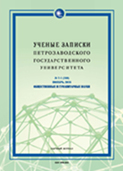ПРИНЦИПЫ ПОСТРОЕНИЯ АНГЛОЯЗЫЧНЫХ СЛОВАРЕЙ ЯЗЫКА ПОЛИТИКОВ
(НА МАТЕРИАЛЕ СЛОВАРЕЙ ЦИТАТ)
COMPILING PRINCIPLES OF ENGLISH DICTIONARIES OF POLITICIANS’ LANGUAGE
(WITH SPECIAL REFERENCE TO DICTIONARIES OF QUOTATIONS)
Author(s): Vera Gennadievna PertsevaSubject(s): Philology
Published by: Петрозаводский государственный университет
Keywords: dictionary; macrostructure; microstructure; quotation; politician; user’s perspective; semantization; lexicographic portrait
Summary/Abstract: The article is concerned with the study of peculiarities of macro-and micro structures essential for compiling special dictionaries ofpoliticians’ quotations. The choice of the topic is determined by the high citation index of famous personalities’ statements employedin different discourse, and political ones in particular. The following methods of investigation were used in the research: the method oflexicographic analysis (observation, generalization, classification) elaborated by the Russian lexicographers L. P. Stupin and O. M. Karpova,the method of comparative analysis, the method of contextual analysis. Based on the result of the study the author concludes thata quotation is both a sign of the language and of the cultural system. It is also a medium of cultural information, unawareness of whichcauses difficulties in the process of decoding. The main task of any lexicographer is a detailed semantization of quotations in focus. Suchscientific approach is paramount in the achievement of communicative purposes stated by an active user. Therefore, the entries in thedictionary of politicians’ quotations should include a maximum number of information categories, which are facilitative in the creationof the multi-dimensional lexicographic portrait of politicians. A pragmatic aspect of the quotation is revealed through the language andspeech zones of the entry. The linguacultural commentary acquaints the user with communicative situations.
Journal: Ученые записки Петрозаводского государственного университета. Общественные и гуманитарные науки
- Issue Year: 2016
- Issue No: 7 (160)
- Page Range: 82-87
- Page Count: 6
- Language: Russian

